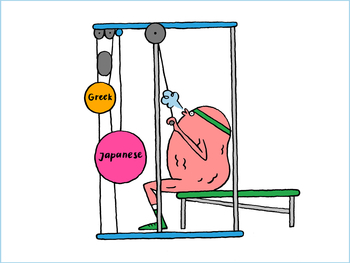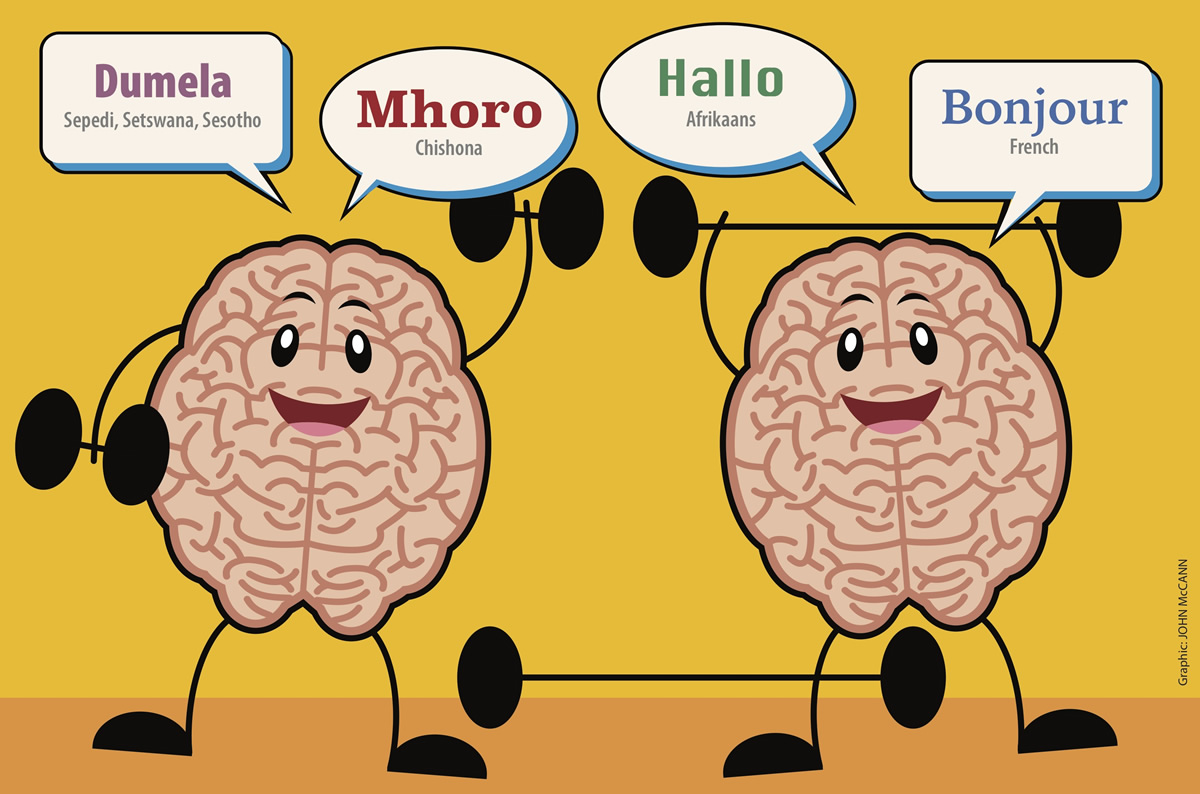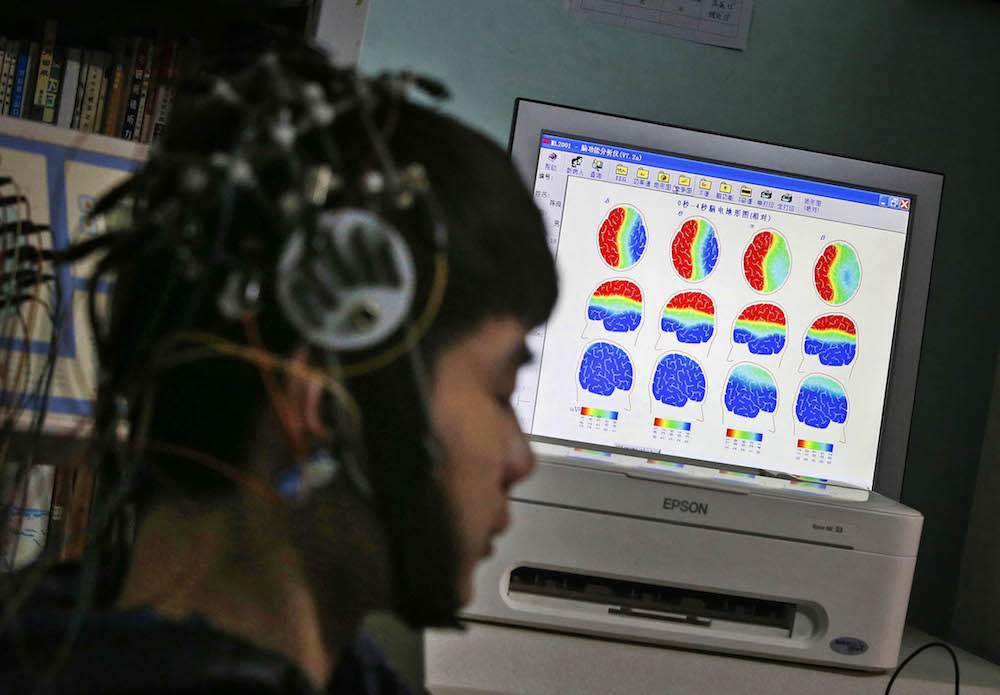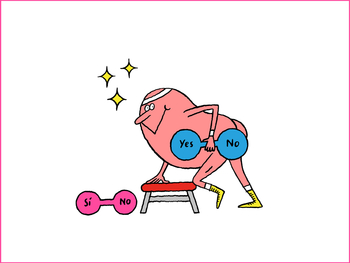Speaking more than one language could lead to better tests scores and even being a more empathetic person.
In a café in south London, two construction workers are engaged in cheerful banter. They are discussing a woman, that much is clear, but the details are lost on me. It’s a shame, because their conversation looks fun and interesting, especially to a nosy person like me. But I don’t speak their language.
Out of curiosity, I interrupt them to ask what they are speaking. With friendly smiles, they both switch easily to English, explaining that they had been speaking isiXhosa.
One of the men, Theo, explains: His mother’s language is Sesotho, his father’s is isiZulu, he learned isiXhosa and isiNdebele from his friends and neighbours, and English and Afrikaans at school.
“I went to Germany before I came here, so I also speak German,” he adds.
Was it easy to learn so many languages?
“Yes, it’s normal,” he laughs.
He’s right. Around the world, more than half of people speak at least two languages. Many countries, such as South Africa, have more than one official national language. So to be monolingual, as many native English speakers are, is to be in the minority, and perhaps to be missing out.
Multilingualism has been shown to have many social, psychological and lifestyle advantages. Moreover, researchers are finding a range of health benefits from speaking more than one language, including faster stroke recovery and delayed onset of dementia.
Could it be that the human brain evolved to be multilingual — that those who speak only one language are not exploiting their full potential?

I am sitting in a laboratory looking at snowflakes on a computer. As each pair of snowflakes appears, I hear a description of one of them. I have to decide which snowflake is being described. The only catch is that the descriptions are in a completely invented language called “Syntaflake”.
It’s part of an experiment by Panos Athanasopoulos, professor of psycholinguistics and bilingual cognition at the United Kingdom’s Lancaster University.
The task is strange and incredibly difficult. Usually, when interacting in a foreign language, there are clues to help you to decipher meaning. The speaker might point to the snowflake as they speak, for example.
Here, I have no such hints.
After a time, I begin to feel a pattern might be emerging with the syntax and sounds. I decide to be mathematical about it and begin to jot down any rules that appear, determined not to “fail” the test.
I chat to Athanasopoulos while my performance is being analysed.
“It’s impossible in the time given to decipher the rules of the language and make sense of what’s being said to you. But your brain is primed to work it out subconsciously. That’s why, if you don’t think about it, you’ll do okay in the test — children do the best.”
The first words ever uttered may have been as far back as 250 000 years ago. And when humans had got one language, it wouldn’t have been long before we had many.
Language evolution can be compared with biological evolution. Whereas genetic change is driven by environmental pressures, languages change and develop because of social pressures. Over time, different groups of early humans would have found themselves speaking different languages. To communicate with other groups — for trade or travel for instance — it would have been necessary for some members of a family or band to speak other tongues.
“If you look at modern huntergatherers, they are almost all multilingual,” says Thomas Bak, a cognitive neurologist who studies the science of languages at the University of Edinburgh.
In Aboriginal Australia, where more than 130 indigenous languages are still spoken, multilingualism is part of the landscape. “You will be walking and talking with someone, and then you might cross a small river and suddenly your companion will switch to another language,” Bak explains.
“People speak the language of the earth.”
This is true elsewhere, too. “Consider in Belgium: you take a train in Liège, the announcements are in French first. Then, pass through Loewen, where the announcements will be in Dutch first, and then in Brussels it reverts back to French first.”

Being so bound up with identity, language is also deeply political. The emergence of European nation states and the growth of imperialism during the 19th century meant it was regarded as disloyal to speak anything other than the one national language.
This perhaps contributed to the widely held opinion — particularly in Britain and the United States — that bringing up bilingual children was harmful to their health and to society more generally. There were warnings that bilingual children would be confused by two languages, have lower intelligence and self-esteem, behave in deviant ways, develop a split personality and even become schizophrenic.
It is a view that persisted until very recently, discouraging many parents from speaking their own mother tongue to their children, for instance. This is in spite of a 1962 experiment, ignored for decades but published in the journal Psychological Monographs: General and Applied, that showed that bilingual children did better than monolinguals in both verbal and nonverbal intelligence tests.
However, studies in the past decade using the latest brain-imaging tools are revealing a swath of cognitive benefits for bilinguals. It’s all to do with how our ever-flexible minds learn to multitask.

Ask me in English what my favourite food is, and I will picture myself in London choosing from the options I enjoy there. But ask me in French, and I transport myself to Paris, where the options I’ll choose are different.
This idea that you act differently when speaking different languages or even gain a new personality is a profound one.
Athanasopoulos and his colleagues have been studying language’s capacity to change people’s perspectives. In one experiment, English and German speakers were shown videos of people moving, such as a woman walking towards her car or a man cycling to the supermarket. English speakers focus on the action and typically describe the scene as “a woman is walking” or “a man is cycling”. German speakers, on the other hand, have a more holistic worldview and will include the goal of the action: they might say (in German) “a woman walks towards her car” or “a man cycles towards the supermarket”.
Part of this is owed to the grammatical toolkit available, Athanasopoulos explains. Unlike German, English has the “-ing” ending to describe actions that are ongoing. This makes English speakers much less likely than German speakers to assign a goal to an action when describing an ambiguous scene.
When he tested English–German bilinguals, however, whether they were action- or goal-focused depended on which country they were tested in. If the bilinguals were tested in Germany, they were goal-focused; in Britan, they were action-focused, no matter which language was used, showing how intertwined culture and language can be in determining a person’s worldview.
In the 1960s, one of the pioneers of psycholinguistics, Susan ErvinTripp, tested Japanese–English bilingual women, asking them to finish sentences in each language. She found that the women ended the sentences very differently depending on which language was used.
For example: “When my wishes conflict with my family …” was completed in Japanese as “it is a time of great unhappiness”; in English, as “I do what I want”. Another example was “Real friends should …”, which was completed as “help each other” in Japanese and “be frank” in English.
From this, Ervin-Tripp concluded that human thought takes place within language mind-sets, and that bilinguals have different mind-sets for each language — an extraordinary idea but one that has been borne out in subsequent studies, and many bilinguals say they feel like a different person when they speak their other language.
These different mind-sets are continually in conflict, however, as bilingual brains sort out which language to use.
In a revealing experiment with his English–German bilingual group, Athanasopoulos got them to recite strings of numbers in either German or English, which in effect blocked out the other language for the exercise. When people were asked to describe videos of movement, their descriptions were more action- or goal-focused depending on which language had been blocked.
When the number recitation was switched to the other language midway, their responses also switched.
So what’s going on? Are there really two separate minds in a bilingual brain? That’s what the snowflake experiment was designed to find out.
To assess how trying to understand the Syntaflake language affected my brain, I took another test, so-called “flanker tasks”, before and after the snowflake task.
As part of flanker tasks, patterns of arrows pointing in different directions appeared on a screen. I had to press the left or right button according to only the direction of the centre arrow.
It’s not a task in which practice improves performance, but when I did the test after completing the snowflake exercise, I was significantly better at it.
“Learning the new language improved your performance second time around,” Athanasopoulos explains.
How can that be?
The flanker tasks were exercises in what’s called cognitive conflict resolution, or our brains have to process and reconcile complex and conflicting information. In this example, when gazing at a screen full of largely left-pointing arrows, I desperately wanted to push the left button despite the centre arrow facing right. This would have been wrong.
I had to block out my impulse and heed the rule instead.
The snowflake test had prepared my brain to do this, specifically by stimulating a section of the brain called the anterior cingulate cortex (ACC). This is similar to how speaking more than one language seems to train the executive system, which deals with higher-level functions such as planning and problem-solving.
A steady stream of studies over the past decade has shown that bilinguals outperform monolinguals in a range of cognitive and social tasks from verbal and nonverbal tests to how well they can read other people, research published in the journal Trends in Cognitive Sciences shows. Greater empathy is thought to be because bilinguals are better at blocking out their own feelings and beliefs in order to concentrate on the other person’s.
In fact, it is possible to distinguish bilingual people from monolinguals simply by looking at scans of their brains, says cognitive neuropsychologist Jubin Abutalebi at the University of San Raffaele in Milan.
“Bilingual people have significantly more grey matter than monolinguals in their anterior cingulate cortex, and that is because they are using it so much more often,” he says. The ACC is like a cognitive muscle, he adds: the more you use it, the stronger, bigger and more flexible it gets.
Bilinguals, it turns out, exercise their executive control all the time because their two languages are constantly competing for attention. Brain-imaging studies show that, when a bilingual person is speaking in one language, their ACC is continually suppressing the urge to use words and grammar from their other language, a 2008 study published in the journal of Language and Cognitive Processes found.
Their mind is always making a judgment about when and how to use the target language. For example, bilinguals rarely get confused between languages, but they may introduce the odd word or sentence of the other language if the person they are talking to also knows it.
For bilinguals, with their exceptionally buff executive control, the flanker test is just a conscious version of what their brains do subconsciously all day long — it’s no wonder they are good at it.
A superior ability to concentrate, solve problems and focus, better mental flexibility and multitasking skills are, of course, valuable in everyday life. But perhaps the most exciting benefit of bilingualism occurs in ageing, when executive function typically declines: bilingualism seems to protect against dementia.
Psycholinguist Ellen Bialystok made the surprising discovery at York University in Toronto while she was comparing an ageing population of monolinguals and bilinguals.
“The bilinguals showed symptoms of Alzheimer’s some four to five years after monolinguals with the same disease pathology,” she says. Being bilingual didn’t prevent people from getting dementia, but it delayed its effects, a 2007 study published in the journal Neuropsychologia found.
In two people whose brains showed similar levels of disease progression, the bilingual person would show symptoms an average of five years after the monolingual, says Bialystok, citing 2010 research in the journal Neurology. She thinks this is because bilingualism rewires the brain and improves the executive system, boosting people’s “cognitive reserve”. It means that as parts of the brain succumb to damage, bilinguals can compensate more because they have extra grey matter and alternative neural pathways.
Speaking more than one language may also help patients recover more quickly after brain injury, a study of 600 stroke survivors in India published in the journal Stroke suggests. In fact, cognitive recovery was twice as likely for bilinguals as for monolinguals.

But in recent years, there has been a backlash against the studies showing the benefits of bilingualism. Some researchers tried and failed to replicate some of the results; others questioned the benefits of improved executive function in everyday life. Bak wrote a rejoinder to the criticisms, and says there is now overwhelming evidence from psychological experiments backed by imaging studies that bilingual and monolingual brains function differently. He says the detractors have made errors in their experimental methods.
Bialystok agrees, adding that it is impossible to examine whether bilingualism improves a child’s school exam results because there are so many confounding factors. But, she says, “given that at the very least it makes no difference — and no study has ever shown it harms performance — considering the very many social and cultural benefits to knowing another language, bilingualism should be encouraged”.
The result of my test in Athanasopoulos’s lab suggests that just 45 minutes of trying to understand another language can improve cognitive function. His study is not yet complete, but other research has shown that these benefits of learning a language can be achieved quickly.
And it may never be too late to learn another language.
Alex Rawlings is a British professional polyglot who speaks 15 languages: “Each language gives you a whole new lifestyle, a whole new shade of meaning,” he says. “It’s addictive!”
“People say it’s too hard as an adult. But I would say it’s much easier after the age of eight. It takes three years for a baby to learn a language, but just months for an adult.”
Bak has done a small pilot study with elderly people learning Gaelic in Scotland and seen significant benefits after just one week. As of 2016, he was planning a much larger trial.
As the recent research shows, that’s a worthwhile investment of time. Being bilingual could keep our minds working longer and better into old age, which could have a massive impact on how we school our children and treat older people. In the meantime, it makes sense to talk, bua, parler, khuluma, sprechen and praat in as many languages as you can.
This article first appeared on Mosaic and is republished here under a Creative Commons licence.

